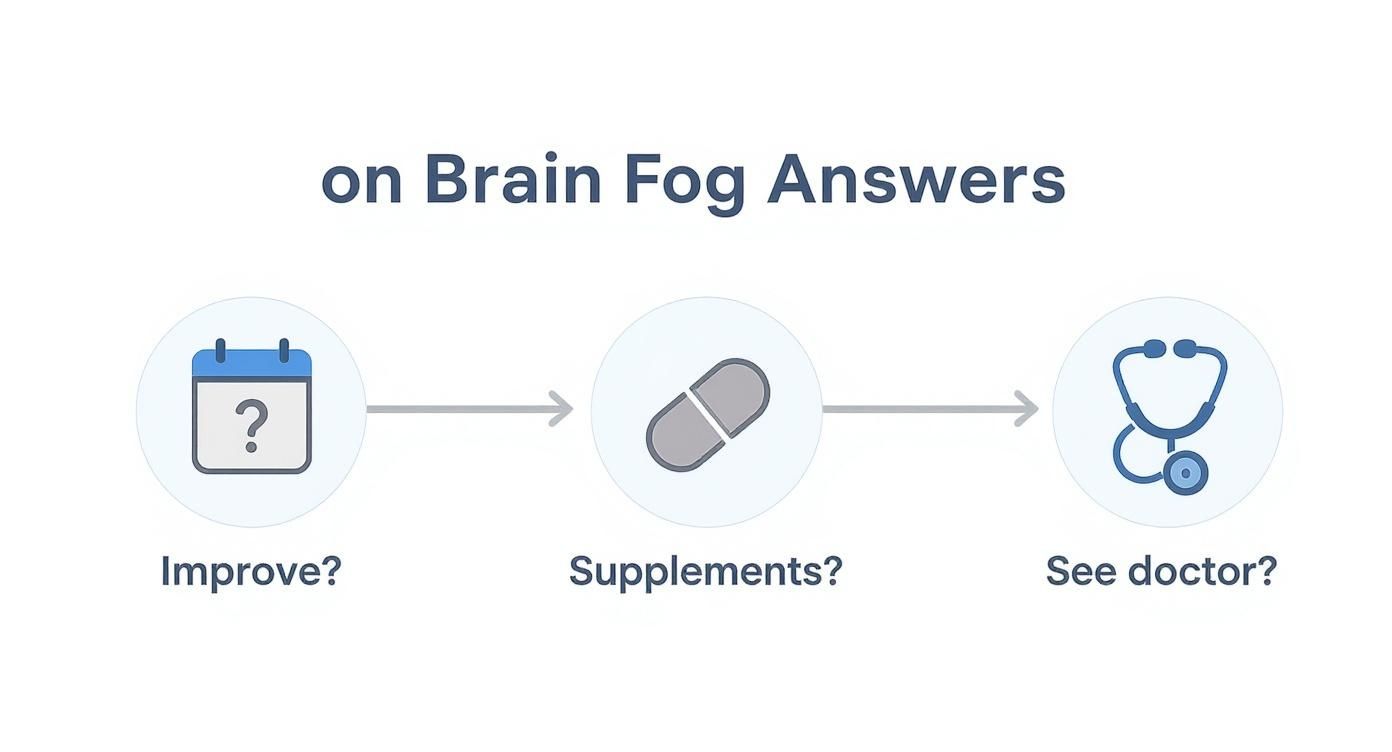
How to Clear Brain Fog: 8 Strategies for Mental Clarity
by Aerchitect
·
TLDR: Brain fog is a sign of mental exhaustion, often caused by stress, poor sleep, or diet. To clear it, focus on a multi-faceted approach: eat brain-boosting foods, prioritize sleep hygiene, manage stress with mindfulness, engage in regular physical activity, and use targeted sensory cues. Functional fragrance mists like Focus (eucalyptus, yuzu, mint), Ground (fig leaf, bergamot, sandalwood), and Calm (thyme, clove, sandalwood) can create intentional resets throughout your day, helping sharpen focus and reduce mental clutter.
That feeling of walking through a mental haze isn’t just in your head—it’s a real, tangible cognitive experience. Knowing how to clear brain fog starts with understanding that it's more than just being tired. It’s a state of mental exhaustion marked by confusion, memory lapses, and a frustrating inability to focus.
It’s your brain signaling that it’s overwhelmed and struggling to keep up. This guide will provide actionable strategies on how to clear brain fog for good.
What Exactly Is Brain Fog?
Ever forgotten a common word mid-sentence? Or walked into a room and completely blanked on why you were there? That’s the signature of brain fog. It’s not a formal medical diagnosis, but a collection of symptoms that signal an underlying imbalance in your system.
This mental cloudiness can be triggered by almost anything—a high-stress project at work, hormonal shifts, or even the lingering effects of recovering from an illness. It has a real impact on daily life, affecting everything from your productivity to simple decision-making. Brain fog often messes with our core cognitive skills, sometimes called executive function, which governs our ability to plan, problem-solve, and pay attention.

What Causes This Mental Haze?
Pinpointing the root cause is the first real step toward reclaiming your mental sharpness. More often than not, brain fog is a symptom of your body being pushed past its limits. Before you can clear the haze, it helps to know where it's coming from.
Here’s a quick look at some of the usual suspects.
Common Brain Fog Triggers and Their Immediate Impact
| Trigger | Common Symptoms |
|---|---|
| Chronic Stress | Trouble with memory, difficulty learning new things, feeling overwhelmed by simple tasks. |
| Poor Sleep | Sluggish thinking, poor concentration, reduced creativity, general mental fatigue. |
| Nutritional Gaps | Lack of focus, mood swings, forgetfulness, low mental energy. |
| Recent Illness | Difficulty concentrating, short-term memory lapses, feeling mentally “slow.” |
These triggers are incredibly common in modern life, which is why so many of us feel like we’re constantly wading through a mental swamp. Understanding what’s behind your brain fog gives you the power to start addressing it directly.
A Holistic Approach to Regaining Clarity
The good news is that you can actively fight back. The key is a multi-faceted approach that addresses both your body and your immediate environment. When you combine smart lifestyle adjustments with targeted sensory support, you create a powerful system for restoring mental clarity.
By understanding your unique triggers, you can begin to design an atmosphere that supports cognitive wellness instead of undermining it.
This journey is about tuning into what your body really needs, whether that’s through better nutrition, smarter sleep habits, or creating intentional moments of reset throughout your day. Your surroundings are just as important. We know our environment deeply influences our emotional and cognitive state, a connection we explore in our guide on designing your atmosphere for emotional well-being.
To truly understand how to clear brain fog, we need to move from theory to practice. In the next sections, we’ll explore tangible strategies, from simple cognitive exercises to leveraging the power of scent with our functional fragrance mists like Focus (scent notes: eucalyptus, yuzu, mint), Calm (scent notes: thyme, clove, sandalwood), and Ground (scent notes: fig leaf, bergamot, sandalwood).
How Can Nutrition Help Clear Brain Fog?
What you put on your plate is one of the most powerful levers you can pull in your fight for mental clarity. Think of your brain as a high-performance engine. The quality of the fuel you give it has a direct, and often immediate, impact on your focus, memory, and cognitive horsepower.
Poor dietary choices, nutritional gaps, and foods that trigger inflammation are the usual suspects behind that frustrating mental haze. The good news? Strategic changes to your diet can create a profound and noticeable shift, a key part of learning how to clear brain fog.

What Foods Should You Eat to Clear Brain Fog?
To push back against cognitive sluggishness, you need to prioritize foods packed with antioxidants, healthy fats, and essential vitamins. These aren't just buzzwords; these nutrients actively work to reduce inflammation and shield your brain from the daily stressors that cloud your thinking.
It's easier than you think to get started. Try weaving these powerhouses into your meals:
- Fatty Fish: Salmon, mackerel, and sardines are loaded with omega-3 fatty acids, which are the literal building blocks for healthy brain cells.
- Blueberries: These little berries are antioxidant giants. They help guard the brain against oxidative stress and improve communication between brain cells.
- Walnuts: A fantastic source of both omega-3s and antioxidants, walnuts have been directly linked to better cognitive test scores.
- Leafy Greens: Think spinach, kale, and collards. They’re filled with brain-protective nutrients like vitamin K, lutein, and folate.
While a nutrient-dense diet is a cornerstone strategy for cutting through brain fog, it's just one piece of the puzzle. It's a powerful tool, especially since non-pharmacological approaches like dietary changes and exercise often show significant promise.
Why is the Gut-Brain Connection Important?
You've probably heard your gut called your "second brain," and it’s not just a saying. A healthy gut microbiome is absolutely essential for producing the neurotransmitters and absorbing the nutrients your brain needs to fire on all cylinders. Processed foods and high sugar intake throw this delicate ecosystem completely out of balance.
Simple swaps can have a surprisingly large impact on your mental clarity. Try choosing whole foods over processed snacks and focusing on staying consistently hydrated throughout the day. It makes a bigger difference than you'd think.
This holistic approach extends beyond just what you eat. The quality of what you allow into your environment—including what you breathe—matters just as much. You can learn more about how clean fragrance ingredients matter for emotional wellness in our guide.
Ultimately, combining a brain-friendly diet with supportive sensory inputs, like our Focus mist with its eucalyptus, yuzu, and mint notes, or the sandalwood blend in our Ground mist, creates your most effective path back to clarity.
How Can You Master Your Sleep and Stress Cycles?
Poor sleep and chronic stress are the two biggest architects of brain fog. This isn't just a feeling; it's physiological.
When we sleep, our brains do critical housekeeping, clearing out metabolic waste that clouds our thinking. Cut that process short, and you wake up feeling mentally sluggish and unfocused. Similarly, chronic stress keeps the body in a constant state of high alert, diverting resources away from cognitive functions like memory and concentration. Knowing how to clear brain fog means tackling these two issues head-on.
How Can You Improve Your Sleep Hygiene Tonight?
Forget generic advice. The first step is creating a non-negotiable wind-down routine that signals to your brain it’s time to power down.
That means no screens for at least an hour before bed. The blue light actively suppresses melatonin, the hormone that governs your sleep-wake cycle. You can't hack this part.
Instead, create a sensory ritual. This is the perfect moment to integrate our Calm functional fragrance mist. The grounding notes of thyme, clove, and sandalwood are specifically chosen to create a tranquil atmosphere. Lightly misting your pillows and the air around you can become a powerful cue for rest, helping you disengage from the day's stressors.
Establishing a consistent pre-sleep ritual is one of the most effective strategies for combating mental exhaustion and restoring cognitive function.
What Are Practical Ways to Manage Daily Stress?
When it comes to stress, the simplest techniques are often the most powerful. Box breathing is a fantastic tool you can use anywhere:
- Inhale for four counts
- Hold for four counts
- Exhale for four counts
- Hold for four counts
This simple exercise can calm your nervous system in just a few minutes, interrupting the cycle before it spirals.
The link between our emotional state, sleep quality, and brain fog is well-documented. Research has even shown that brain fog severity strongly correlates with symptoms of anxiety, depression, and poor sleep. You can explore the full study on affective disorders and cognitive dysfunction to see the data for yourself.
Integrating sensory cues is the fastest way to interrupt the stress cycle. We've written a whole guide on this, which you can read here: the science of scent and mood in our detailed guide.
How Does Movement Refresh Your Mind?
Physical activity is one of the fastest and most effective ways to cut through that heavy, sluggish feeling of brain fog. When you're feeling unfocused, the last thing you want to do is move, but even a little gentle activity can create an immediate, noticeable shift. It's not about forcing a grueling workout; strategic movement is the real key to understanding how to clear brain fog.
Getting your body moving increases circulation, sending a fresh supply of oxygen and nutrient-rich blood straight to your brain. Think of it as hitting a natural reset button—it helps clear out the metabolic gunk that contributes to feeling cloudy and slow.

What Kind of Movement Works Best?
The "right" kind of movement is whatever your mind and body need in that moment. The goal is to feel refreshed and energized, not completely wiped out.
Here are a few options that are incredibly effective:
- Brisk Walking: Never underestimate the power of a simple 20-minute walk. It’s just enough aerobic exercise to boost your heart rate and improve blood flow to the brain, which research shows can enhance memory and executive function.
- Yoga or Stretching: Slower, more mindful movements are perfect for calming an overstimulated nervous system. Practices like yoga help lower stress hormones and increase body awareness, leaving you feeling more centered and far less scattered.
- Dancing: Put on your favorite song and just move for a few minutes. It combines physical activity with an instant mood boost, making it a quick and genuinely joyful way to shake off the mental cobwebs.
The key is consistency, not intensity. A short daily walk is far more beneficial for long-term mental clarity than one punishing workout a week.
How Can You Amplify the Benefits of Movement?
To really lock in the mental clarity from your movement, pair it with sensory cues that reinforce that feeling of calm focus. This is where you can build a powerful, quick ritual. After a walk or a yoga session, take just a minute for a mindful cooldown.
This is the perfect moment to use our Ground functional fragrance mist. The earthy notes of fig leaf, the brightness of bergamot, and the warmth of sandalwood were blended specifically to help center your mind.
A few spritzes in your space can elevate that post-movement feeling of clear-headed presence, solidifying the mental benefits of your physical effort and turning a simple action into a lasting reset.
How Can You Train Your Brain for Sustained Focus?
Diet and exercise are foundational, but to really build cognitive resilience, you have to actively train your brain. Think of your attention span like a muscle—it gets stronger with consistent, targeted exercise. This isn't about brute-forcing your way through the haze. It's about using structured techniques to rebuild your ability to concentrate over time.
A great starting point is time-blocking, and the best-known method is the Pomodoro Technique. It’s deceptively simple: work in focused 25-minute sprints, separated by short five-minute breaks. This trains your brain to engage deeply without feeling overwhelmed, making it a practical first step in learning how to clear brain fog during a busy workday.
How Can You Actively Challenge Your Brain?
Getting your mind sharp again also means getting it out of its comfort zone. Learning a new skill—whether it’s a language, a musical instrument, or a complex game—actively forges new neural pathways. This process, known as neuroplasticity, literally makes your brain more flexible and resistant to mental fatigue.
Even small cognitive challenges can make a big difference:
- Do puzzles: Crosswords, Sudoku, or jigsaw puzzles are not just pastimes; they require logical reasoning and memory recall.
- Read a challenging book: Step outside your usual genre. Exposing your brain to new vocabulary and complex ideas is like taking it to the gym.
- Try a memory game: Use apps or even simple card games to specifically target and improve your short-term memory.
Can Scent Help You Focus Better?
Absolutely. Scent is a direct line to the brain's emotional and memory centers, and you can use this connection to your advantage. By creating a sensory cue, you can signal to your brain that it’s time to concentrate. This is precisely why we designed our Focus functional fragrance mist.
The invigorating blend of eucalyptus, yuzu, and mint is specifically formulated to create an atmosphere primed for deep work. The sharp, clean notes act as a sensory anchor, helping to cut through mental clutter and signal to your brain that it’s time to engage.
Misting your workspace before starting a task can transform it into a zone of productivity. Over time, your brain begins to associate this specific aroma with concentration, making it easier to slip into a flow state. This simple ritual is a key part of how to clear brain fog by using your environment to support your mind. For more strategies on this, you can learn about improving focus and concentration in our guide.
FAQs About How to Clear Brain Fog
We get it. When you’re trying to clear your head, you want clear answers. The journey out of the fog brings up real, practical questions, and knowing what to expect can make all the difference. Here’s a straightforward look at some of the most common concerns about how to clear brain fog.
How Long Does It Take to See Improvements?
This is the big one, and the honest answer is: it depends. The timeline for clearing brain fog is entirely individual because the root cause dictates the recovery speed.
If your fog is from something simple like a bad night's sleep or dehydration, you could feel a massive shift in just a day or two after course-correcting. But if it’s tied to deeper issues like chronic stress, a nutritional gap, or post-viral fatigue, you’re looking at a longer game—think weeks or even months of consistent, gentle effort.
The key is patience. Ditch the search for an overnight fix and focus on small, sustainable changes. That’s where real progress happens.
Are Supplements a Good Idea for Brain Fog?
Supplements can be a powerful ally, but they are absolutely not a magic bullet. Think of them as support, not a solution. Nutrients like Vitamin B12, magnesium, and omega-3 fatty acids are non-negotiable for sharp brain function, and a deficiency is a common culprit behind cognitive sludge.
Here’s the critical step: talk to a healthcare provider before you start taking supplements. They can run tests to pinpoint what you’re actually missing and recommend the right dosages. Guessing is just a waste of time and money; targeted support is what moves the needle.
When Should You See a Doctor for Brain Fog?
Lifestyle tweaks can handle a lot, but sometimes brain fog is your body’s check-engine light for something more serious. It’s time to book an appointment with a doctor if:
- The fog is so thick it’s getting in the way of your work, relationships, or daily responsibilities.
- It comes with other red-flag symptoms, like intense headaches, numbness, or a level of fatigue that feels bone-deep and unexplained.
- It showed up suddenly, especially after an injury or illness.
A doctor can rule out underlying conditions and get you on the right path. Your mental clarity is a vital sign of your overall health—treat it that way.
How to Create Your Daily Anti-Fog Routine
Knowing the why behind brain fog is one thing. Actually putting a plan into action day after day is something else entirely. Building a routine shouldn't feel like another monumental task on your to-do list.
The goal here isn't perfection; it's progress. We're talking about small, sustainable habits that stack up to create a powerful system for keeping your mind sharp and resilient. Layering these simple actions into your day gives your brain the structure it needs to fight off mental fatigue before it even starts.
This timeline shows the typical path people take—from first noticing the fog to making lifestyle tweaks and, eventually, knowing when it’s time to call a professional.

As you can see, the journey to clarity almost always starts with small, daily adjustments before moving on to more targeted support.
What Does an Anti-Fog Routine Look Like?
A routine that actually sticks is broken into manageable parts. Instead of a long, daunting list, think in terms of anchoring tiny habits to your morning, afternoon, and evening.
Morning Kickstart (First 30 Minutes)
- Hydrate Immediately: Before the coffee maker even finishes brewing, drink a large glass of water. Your brain is dehydrated after a long night's sleep.
- Mindful Moment: Just five minutes of simple, focused breathing can make a world of difference. A quick spritz of Focus mist (eucalyptus, yuzu, mint) helps awaken the senses and sharpen your attention for the day ahead.
- Gentle Movement: Ten minutes of light stretching or a brisk walk around the block is enough to get your blood flowing and deliver fresh oxygen to your brain.
Afternoon Reset (Around 2 PM)
- Screen Break: The afternoon slump is real. Step away from all devices for at least 15 minutes. Your eyes and your brain will thank you.
- Quick Walk: A short walk outside is one of the fastest ways I know to shake off mental cobwebs. The combination of movement and fresh air is a powerful reset.
- Sensory Shift: Use our Ground mist (fig leaf, bergamot, sandalwood) to create an intentional pause, helping you recenter your focus for the last leg of the workday.
Evening Wind-Down (Final Hour)
- Tech-Free Zone: This one is non-negotiable. Power down all screens at least 60 minutes before you plan to sleep. The blue light is a known enemy of restorative rest.
- Relaxing Ritual: Create a calming atmosphere with our Calm mist (thyme, clove, sandalwood). It's a simple cue to your nervous system that it's time to downshift.
- Journal or Read: Wind down with a non-digital activity. Reading a physical book or jotting down a few thoughts helps your mind transition gracefully into sleep mode.
Building these small actions into your day establishes powerful signals for your brain. You can learn more about the psychology of reset rituals and how they create significant mental shifts.
For a broader perspective on managing cognitive clarity, consider exploring these further quick tips on reducing brain fog.
